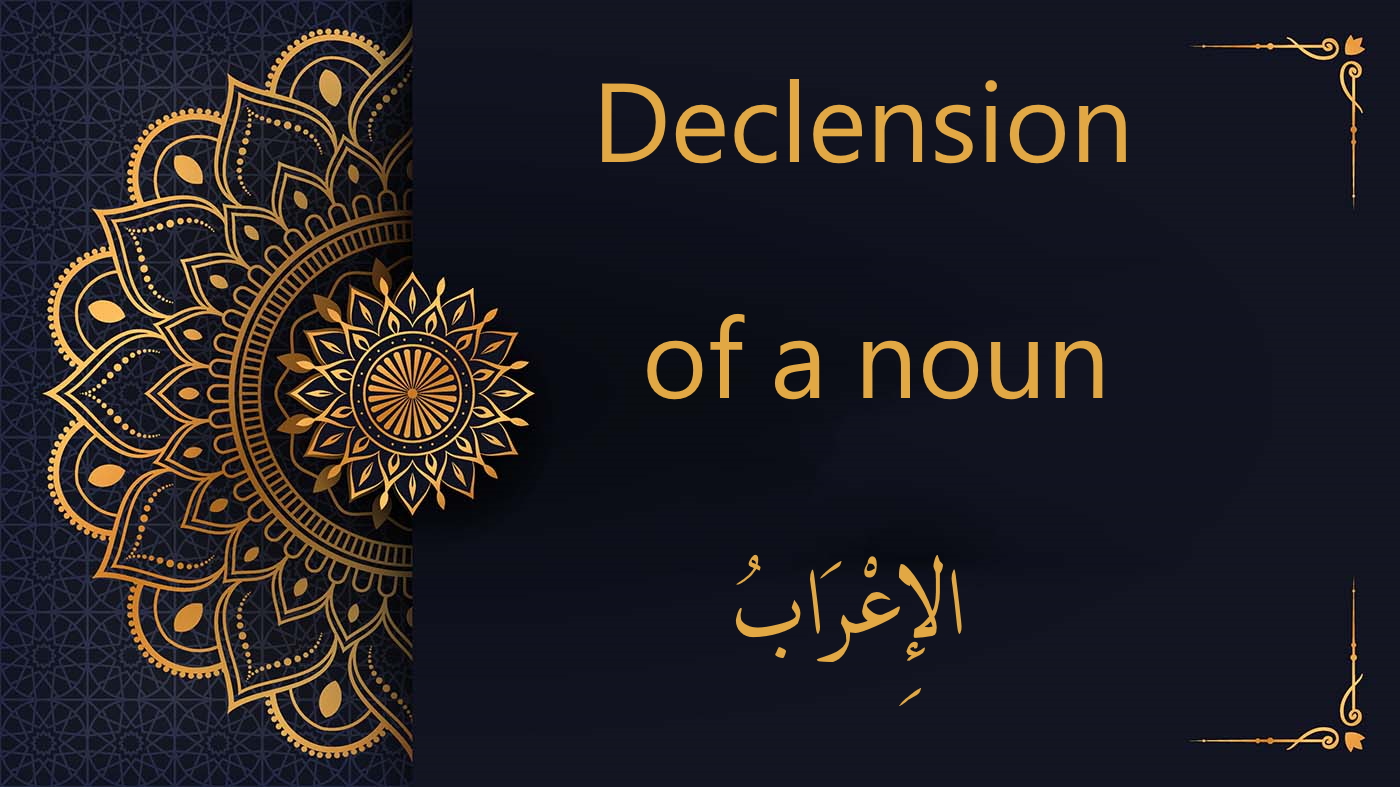
In Arabic, the term for declension is الإِعْرَابُ, introduced earlier in Chapter 2. Based on الإِعْرَابُ, nouns are categorized into two groups: Indeclinable (الْمَبْنِي) and Declinable (الْمُعْرَبُ).
In Arabic, a noun with a consistent final vowel is termed الْمَبْنِي. This means the diacritical mark (harakah) on the noun’s final letter remains static across the nominative, accusative, and genitive cases.
Specific categories of nouns fall under this indeclinable classification:
Pronouns: This encompasses all forms, including أَنا (I), أَنْتَ (you), هُوَ (he), هُمْ (they), and هُمَا (two of them).
Verbs with Embedded Pronouns: Past tense verbs incorporating implicit pronouns such as أَنْتَ and أَنَا are indeclinable. Examples include ضَرَبْتَ (you hit) and أَكَلْتُ (I ate).
Interrogative Particles and Prepositions: Various particles fit this category, including question-related particles like هَلْ (is) and أَيْنَ (where); prepositions such as مِنْ (from) and فِي (in); and other particles denoting mood like إِنْ (if) and لَمْ (did not).
Relative and Demonstrative Pronouns: These refer to pronouns like تِلْكَ (that), الَّذِي (who/which), and أُولَئِكَ (those).
Nouns with Specific Alif Endings: Certain nouns ending in an alif (ا) but spelled with a ى, like مُوْسَى (Moses) and عِيْسَى (Jesus), fall under this category. Such an alif is recognized as الأَلِفُ الْمَقْصُوْرَةُ. Other examples in this group include كُبْرَى (major), بُشْرَى (good news), and هُدَى (guidance)
For instance:
ذَٰلِكَ الْكِتَابُ لَا رَيْبَ ۛ فِيهِ ۛ هُدًى لِّلْمُتَّقِينَ
This is the Book about which there is no doubt, a guidance for those conscious of Allah (2:2)
قَالَ أَلْقِهَا يَا مُوسَىٰ
[Allah] said, “Throw it down, O Moses.” (20:19)
فَلَا تَقْعُدْ بَعْدَ الذِّكْرَىٰ مَعَ الْقَوْمِ الظَّالِمِينَ
then do not remain after the reminder with the wrongdoing people. (6:68)
لَقَدْ رَأَىٰ مِنْ آيَاتِ رَبِّهِ الْكُبْرَىٰ
He certainly saw of the greatest signs of his Lord. (53:18)
In Arabic, a noun that undergoes declension is termed الْمُعْرَبُ, meaning its ending is variable depending on the grammatical case. Such nouns can be categorized into two main types:
الْمُنْصَرِفُ (Triptotes): These nouns are fully declinable and clearly exhibit their grammatical case through either الإِعرَابُ بِالحَرَكَةِ (declension using diacritical marks) or الإِعْرَابُ بِالحُرُوفِ (declension using letters). Examples include مُسْلِمٌ (a Muslim) and خَادِمٌ (a servant). They adjust their endings according to the nominative, accusative, and genitive cases.
الْمَمْنُوعُ مِنَ الصَّرْفِ (Diptotes): These nouns have restricted declension. Most of them, especially those of non-Arabic origin, whether they are personal names or geographical terms, and adjectives depicting colors, fall under this category. Examples encompass color descriptors like أَسْوَدُ (black) and أَحْمَرُ (red), as well as names such as إِبْرَاهِيمُ (Abraham), داوُودُ (David), هَارُوتُ (Harut), ثَمُودُ (Thamud), غَضْبَانُ (Ghadban), and فِرْعَوْنَ (Pharaoh). Notably, these nouns will never carry tanwin (nunation) or kasrah (short ‘i’ sound).
Thus, when delving into Arabic grammar, understanding the distinction between triptotes and diptotes is crucial, as each has its unique declension rules and characteristics.
Examples:
قَالَ الْمَلَأُ مِن قَوْمِ فِرْعَوْنَ إِنَّ هَـٰذَا لَسَاحِرٌ عَلِيمٌ
Said the eminent among the people of Pharaoh, “Indeed, this is a learned magician (7:109)
قُلْ بَلْ مِلَّةَ إِبْرَاهِيمَ حَنِيفًا
Rather, [we follow] the religion of Abraham, inclining toward truth, (2:135)
وَإِذْ يَرْفَعُ إِبْرَاهِيمُ الْقَوَاعِدَ مِنَ الْبَيْتِ وَإِسْمَاعِيلُ رَبَّنَا تَقَبَّلْ مِنَّا
اذْهَبْ إِلَىٰ فِرْعَوْنَ إِنَّهُ طَغَىٰ
“Go to Pharaoh. Indeed, he has transgressed. (79:17)
وَقَتَلَ دَاوُودُ جَالُوتَ
and David killed Goliath (2:251)
قَالَ إِنَّهُ يَقُولُ إِنَّهَا بَقَرَةٌ صَفْرَاءُ فَاقِعٌ لَّوْنُهَا تَسُرُّ النَّاظِرِينَ
He said, “He says, ‘It is a yellow cow, bright in color – pleasing to the observers.’ “ (2:69)
بِرَسُولٍ يَأْتِي مِن بَعْدِي اسْمُهُ أَحْمَدُ
of a messenger to come after me, whose name is Ahmad. (61:6)
This lesson on Arabic nuances concludes here. Insha’Allah, our subsequent session will delve into the exception – الاسْتِثْنَاءُ in Arabic.
Al-dirassa Institute invites you on a linguistic journey with our expert teachers to master the Arabic language. Should you wish to further your studies, we welcome your inquiries.
Discover the experiences of our delighted clients who have thoroughly enjoyed utilizing this standout feature.
Alhamdulillah I‘m very pleased with the arabic and Qur’an lessons I receive from teacher Umm Tasneem and I‘m also content with the al-dirassa administration team who were very quick in answering any questions I had. In a month I progressed a lot and I cannot wait to continue my studies with al-dirassa. May Allah reward everyone at al-dirassa.
Verified review - view original
My Qur’an teacher is fantastic, she teaches me in a loving and kind way where I look forward to the lessons and learn so much. My Arabic teacher is equally as nice and has a lot of patience with me, she has great expertise in the field and I’ve progressed really quickly with her. Thank you Al-dirassa!
Verified review - view original
Don’t want to go through the translation anymore?
30 free minutes with your qualified Egyptian teacher.

Al-dirassa Institute offers you a gift to help you begin your journey to being fluent in Arabic and learning the Quran.

Al-dirassa Institute offers you a gift to help you begin your journey to being fluent in Arabic and learning the Quran.